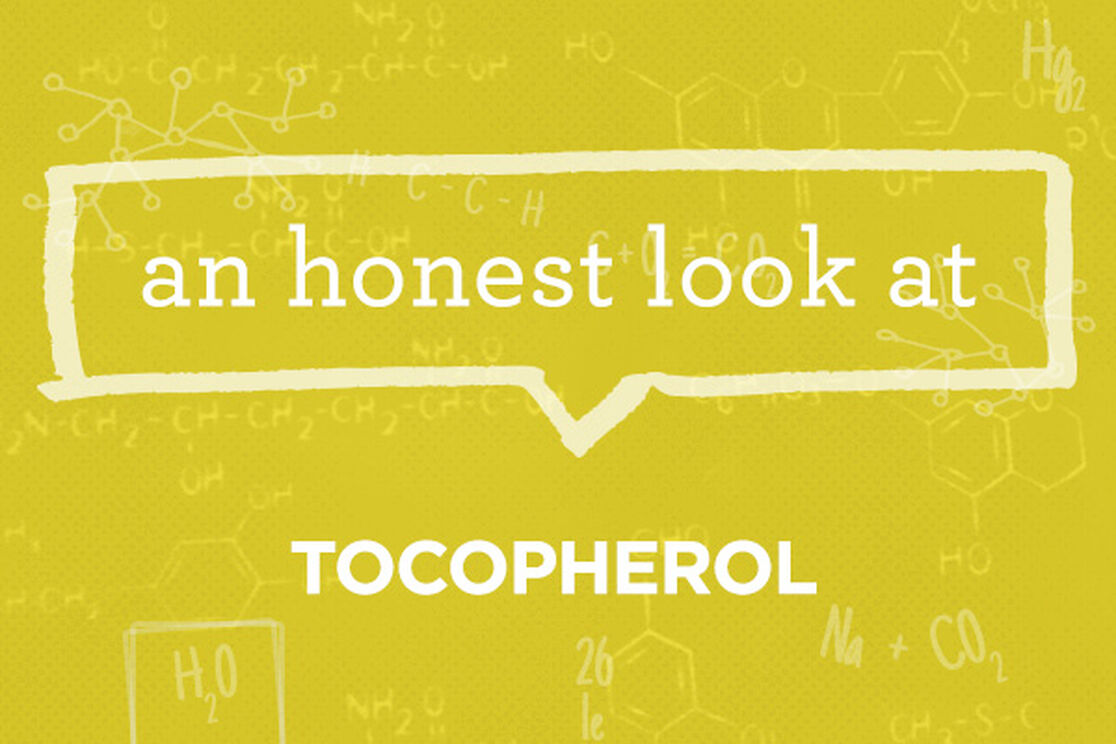Ingredient: Tocopherol
What it is: Tocopherol is a form of Vitamin E typically derived from vegetable oils. Our tocopherol is from sunflower seed oil from Spain and non-GMO soy beans.
What it does: Tocopherol is known as an antioxidant superhero that provides awesome protection for your skin when included in body care products. (This shouldn’t be terribly surprising, since tocopherols make up 96% of your skin’s natural antioxidant defense system!)
Studies show tocopherol:
- Absorbs UV rays and helps prevent UV-induced free radical damage to skin
- Acts as an anti-inflammatory agent in skin
- Helps moisturize
- Helps reduce pollution-related free radical damage
There’s also preliminary evidence that it can help prevent scarring and reduce the signs of aging, too. Studies are underway to learn more about the many ways tocopherol and other forms of vitamin E benefit skin and overall health.
While some people apply vitamin E oil directly to their skin, concentrations as low as 0.1% can increase tocopherol levels in the skin. So, merely having it as an added ingredient in your body care products is enough to help provide daily skin protection.
Why we use it: Tocopherol’s antioxidant properties not only help protect your skin, but also help protect products by acting as a preservative and preventing natural oils like coconut and jojoba from going rancid. It’s a naturally effective multi-tasker, so it’s easy to see why we wanted to include it in body care products such as our Lip Balm, Sunscreen Stick, Healing Balm, Hand Sanitizer Gel, Diaper Rash Cream, Organic Shave Oil, Organic Belly Balm, and Organic Breathe Easy Rub.
Why we’re featuring it today: We’ve had some customers reach out and ask about the EWG rating of tocopherol: It’s a 1, but they list contamination and cancer concerns, which raises a yellow flag for people. We don’t blame them – anytime we see an ingredient associated with cancer, we raise a flag, too! As always, we put ourselves and our ingredients up to the highest (and strictest) standards, which is why our body care products are compliant with the Whole Foods Premium Body Care Standards.
Here’s the deal: There are two studies linking multiple tocopherol injections to tumor formation in mice. These findings don’t translate to low-dose, dermal application, which is how daily body care products containing tocopherol are used. There’s no evidence linking cancer to the use of body care products containing tocopherol; in fact, this study showed topical application on mice resulted in fewer incidences of skin cancer and this study confirmed it in humans.
We support, respect, and actively work with EWG, but sometimes these ratings can be confusing or misleading for consumers (read more of our Honest thoughts on the topic here). In this case, they’ve raised a warning based on evidence that doesn’t always translate to the products they’re rating and gives more attention to the potential risk than the studies demonstrating potential benefits. Tocopherol still ranks a safe, respectable “1” in their database and we believe tocopherol is absolutely appropriate for your everyday use.
We hope we’ve helped you lower that yellow flag! Still have questions? Let us know in the comments and we’ll do our best to help!
References:
- Fuchs J, Weber S, Podda M, et al. HPLC analysis of vitamin E isoforms in human epidermis: correlation with minimal erythema dose and free radical scavenging activity. Free Radic Biol Med. 2003 Feb 1;34(3):330-6.
- Gehring W, Fluhr J, Gloor M. Influence of vitamin E acetate on stratum corneum hydration. Arzneimittelforschung. 1998;48(7):772-775.
- Gonullu U, Sensoy D, Uner M, Yener G, Altinkurt T. Comparing the moisturizing effects of ascorbic acid and calcium ascorbate against that of tocopherol in emulsions. J Cosmet Sci. 2006;57(6):465-473.
- Han SN, Meydani SN. Impact of vitamin E on immune function and its clinical implications. Expert Rev Clin Immunol. 2006;2(4):561-567.
- Jin GH, Liu Y, Jin SZ, Liu XD, Liu SZ. UVB induced oxidative stress in human keratinocytes and protective effect of antioxidant agents. Radiat Environ Biophys. 2007;46(1):61-68.
- Kondo S, Mamada A, Yamaguchi J, Fukuro S. Protective effect of dl-alpha-tocopherol on the cytotoxicity of ultraviolet B against human skin fibroblasts in vitro. Photodermatol Photoimmunol Photomed. 1990;7(4):173-177.
- Linus Pauling Institute. Micronutrient Research for Optimum Health. (n.d.). Retrieved September 22, 2014, from http://lpi.oregonstate.edu/infocenter/skin/vitaminE/vitaminEskinref.html#ref93
- Meydani SN, Barklund MP, Liu S, et al. Vitamin E supplementation enhances cell-mediated immunity in healthy elderly subjects. Am J Clin Nutr. 1990;52(3):557-563.
- Stewart MS, Cameron GS, Pence BC. Antioxidant nutrients protect against UVB-induced oxidative damage to DNA of mouse keratinocytes in culture. J Invest Dermatol. 1996;106(5):1086-1089.
- Thiele JJ, Ekanayake-Mudiyanselage S. Vitamin E in human skin: organ-specific physiology and considerations for its use in dermatology. Mol Aspects Med. 2007;28(5-6):646-667.
- Thiele JJ, Traber MG, Podda M, Tsang K, Cross CE, Packer L. Ozone depletes tocopherols and tocotrienols topically applied to murine skin. FEBS Lett. 1997;401(2-3):167-170.
We aim to provide you with the most honest and credible information possible. This article was reviewed for accuracy by The Honest Team and its internal technical experts.
blog_review_statement



